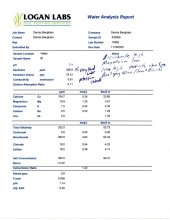posted 2 years ago
We are in our new place in the mountains of NM. Well is 400 ft deep and thank God produces a good amount. We are at the time trying to decide whether to install a water softener system or to just wait and see, but our intuition is that we do need it. Well, our neighbors have one. We are in the middle of nowhere in the mountain but have 2 neighbors that have lived here for over 20 years and they say we need it. We wish we didn't. It isn't exciting to invest all that money and then be a slave to the endless salt buying.
Searching here for posts on the subject, I find mixed experiences but to clarify a bit, here are our water test results: Hardness is 1500 mg/L, Total Dissolved Solids 1900 mg/L, Calcium 422.3 mg/L, Magnesium 99.51 mg/L, Silica 16, Sodium 59, Strontium (What is that??) 7.3, Alkalinity 180, Sulfate 1200.
We are going to get and RO system, but again, wish the softener was not necessary... but it really seems to be with that extreme hardness...
Hoping to hear from your experience and any thoughts or suggestions will be so appreciated.







